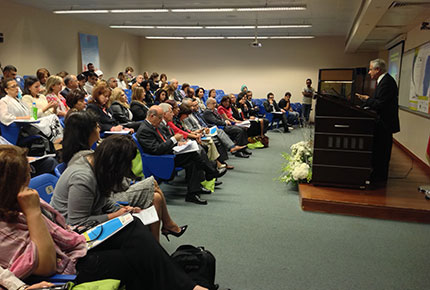Joining hands to improve university programs
LAU conference emphasizes on the quality and added value in university education.
On November 1 and 2, LAU hosted a conference on “Quality and Added Value of Graduate and Postgraduate Programs in Education in Arab Universities” that aimed at addressing the major challenges of university education in the Arab world, particularly with respect to scientific research in theses and dissertations at the master’s and doctoral levels.
Under the patronage of the Ministry of Education and Higher Education in Lebanon, the event was organized in close collaboration with the Arab Educational Information Network (SHAMAA) and the Lebanese Association for Educational Studies (LAES).
Kicking off the event, LAU President Dr. Joseph G. Jabbra highlighted the importance of this partnership in co-organizing the event and said that there is strength in numbers. “Collaboration allows for different points of view to be heard and allows for better decision making,” he said. According to Jabbra, robust commitment to the highest standards of academic excellence was the impetus for hosting the conference. “It is about time we be at the cutting edge of quality education, we cannot stay behind in a globalized world,” he asserted.
LAES president and director of LAU’s Institutional Research & Assessment Office (IRA), Dr. Diane Nauffal explained how the event served as a unique opportunity for leaders in the field to network with one another and share knowledge. “There is a genuine concern for the quality of graduate and postgraduate programs in the regions,” she said.
The two-day conference looked at both theoretical and practical issues including how a graduate program should be structured to ensure quality is upheld. Many conference participants noted that there is little standardization between the various institutions of higher learning in the country.
To provide guidance on these matters, specialists were given the podium to offer their expertise. Dakmara-Ana Georgescu, a UNESCO program specialist, gave a talk on the international organization’s mandate toward higher education and offered background on their work, already in progress, on quality assurance in universities across the Arab world. “In the past decade we have seen a sharp increase in the number of people who have access to higher education in this part of the world. However, this increase has brought with it quality concerns,” she said.
Dr. Ahmad Jammal, director general of higher education, outlined the Ministry of Education and Higher Education’s activities with respect to identifying criteria and standards by which to measure the quality of doctoral programs.
“This conference was a unique opportunity for different groups to join hands and work together,” said Hadeel Dbaibo, a research graduate assistant at the American University of Beirut who attended the event.
Hanady Geagea, SHAMAA volunteer and conference attendee, agreed wholeheartedly. “This allows participants to collectively identify the gaps in the programs and to highlight the major points that need to be worked out to improve quality,” she explained.
Concerns and complaints among the various attending universities were collected so that they could be addressed in the future.
The conference was sponsored by iSTYLE Apple Premium Reseller (Gold Sponsor), Azm Educational Campus, BankMed, EBSCO, (Silver Sponsors).
More
Latest Stories
- Into the Psychology of Justice
- Alumnus Zak Kassas on Navigation, Spoofing and the Future of GPS
- Hearing Between the Lines
- LAU Hematology Conference 2025: Advancing Science Through Interdisciplinary Exchange
- Dr. Chaouki T. Abdallah Invested as LAU’s 10th President
- LAU Guides Its Students Through the Code of Conduct
- Innovative Procedure at LAU Medical Center–Rizk Hospital Signals Hope for a Patient With a Congenital Disease
- LAU’s Inaugural PodChat Session Addresses AI Detection in the Classroom


